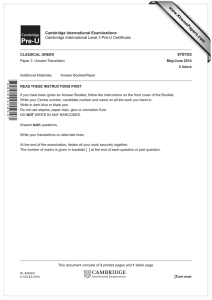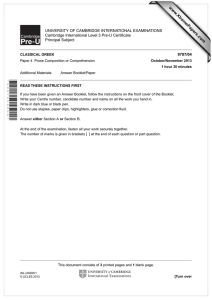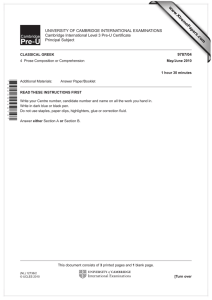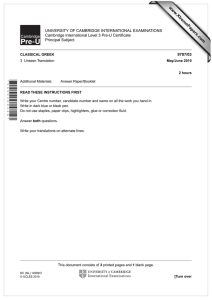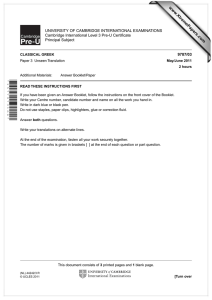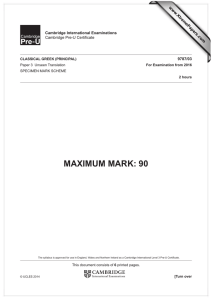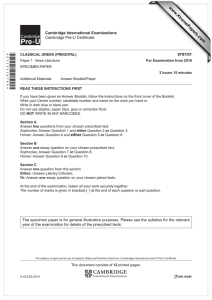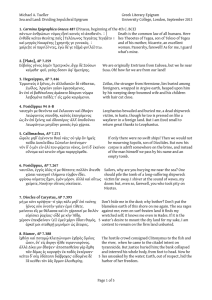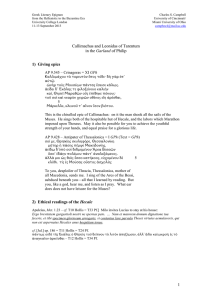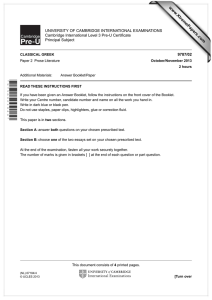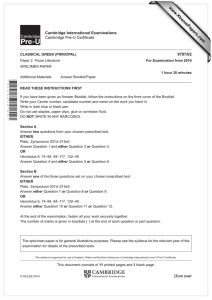www.XtremePapers.com Cambridge International Examinations 9787/04 Cambridge International Level 3 Pre-U Certificate
advertisement
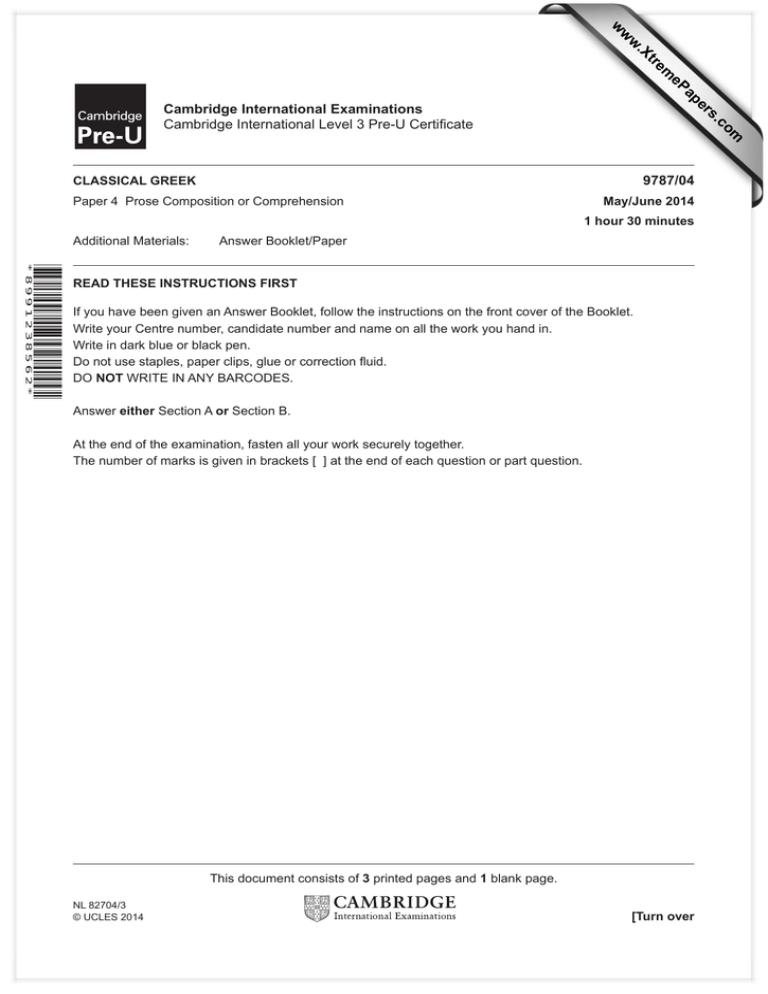
w w ap eP m e tr .X w om .c s er Cambridge International Examinations Cambridge International Level 3 Pre-U Certificate 9787/04 CLASSICAL GREEK Paper 4 Prose Composition or Comprehension May/June 2014 1 hour 30 minutes Additional Materials: Answer Booklet/Paper *8991238562* READ THESE INSTRUCTIONS FIRST If you have been given an Answer Booklet, follow the instructions on the front cover of the Booklet. Write your Centre number, candidate number and name on all the work you hand in. Write in dark blue or black pen. Do not use staples, paper clips, glue or correction fluid. DO NOT WRITE IN ANY BARCODES. Answer either Section A or Section B. At the end of the examination, fasten all your work securely together. The number of marks is given in brackets [ ] at the end of each question or part question. This document consists of 3 printed pages and 1 blank page. NL 82704/3 © UCLES 2014 [Turn over 2 Either Section A On alternate lines translate the following passage into Greek: ‘So that my advice is clear, I shall speak freely: you should leave this country behind and give Mardonius the forces which he has requested. If he defeats the Greeks, it will be your work, as it has been done by your slave. Even if he were not to be victorious, it would not be at all important, as long as you are safe. While you survive, the Greeks will have to endure many terrible things. Surely we are not afraid that Mardonius may fail? No, for he is merely a slave, and the Greeks will win a poor victory even if they kill him. And you will return home having achieved what you wanted: indeed you have been so successful that Athens is in flames.’ Artemisia’s words pleased Xerxes, for they were the expression of his own thinking. [Total: 40] Or Section B Read the passage and answer the questions which follow. After the death of her lover, Antony, in Egypt, Cleopatra mourns him. ἦν δὲ Κορνήλιος Δολοβέλλας ἐν τοῖς Καίσαρος ἑταίροις. οὗτος εἶχε πρὸς τὴν Κλεοπάτραν οὐκ ἀηδῶς· καὶ τότε αὐτῇ δεηθείσῃ κρύφα πέμψας ἐξήγγειλεν ὡς αὐτὸς μὲν ὁ Καῖσαρ ἀναζεύγνυσι πεζῇ διὰ Συρίας, ἐκείνην δὲ μετὰ τῶν τέκνων ἀποστέλλειν ἔγνωκεν. ἡ δὲ ἀκούσασα ταῦτα πρῶτον μὲν ἐδεήθη Καίσαρος αὐτὴν ἐασαῖ χοὰς ἐπενεγκεῖν Ἀντωνίῳ· καὶ συγχωρήσαντος ἐπὶ τὸν τάφον κομισθεῖσα καὶ περιπεσοῦσα τῇ σορῷ, ‘ὦ φίλε Ἀντώνιε,’ εἶπεν, ‘ἔθαπτον μέν ἔτι χερσὶν ἐλευθέραις, σπένδω δὲ νῦν αἰχμάλωτος οὖσα, καὶ φρουρουμένη μήτε κοπετοῖς μήτε θρήνοις αἰκίσασθαι τὸ δοῦλον τοῦτο σῶμα. ἄλλας δὲ μὴ προσδέχου τιμὰς ἢ χοάς· ἀλλ᾽ αὗταί σοι τελευταῖαι Κλεοπάτρας ἀγομένης. ζῶντας μὲν γὰρ ἡμᾶς οὐθέν ἀλλήλων διέστησε, κινδυνεύομεν δὲ τῷ θανάτῳ διαμείψασθαι τοὺς τόπους· σὺ μὲν ὁ Ῥωμαῖος ἐνταῦθα κείμενος, ἐγὼ δ᾽ ἡ δύστηνος ἐν Ἰταλίᾳ, τοσοῦτο τῆς σῆς μεταλαβοῦσα χώρας μόνον. ἀλλ᾽ εἰ δή τις τῶν ἐκεῖ θεῶν ἀλκὴ καὶ δύναμις - οἱ γὰρ ἐνταῦθα προὔδωκαν -, μὴ πρόῃ ζῶσαν τὴν σεαυτοῦ γυναῖκα, μηδ᾽ ἐν ἐμοὶ περιΐδῃς θριαμβευόμενον σεαυτόν, ἀλλ᾽ ἐνταῦθά με κρύψον μετὰ σεαυτοῦ καὶ σύνθαψον, ὡς ἐμοὶ μυρίων κακῶν ὄντων οὐδὲν οὕτω μέγα καὶ δεινόν ἐστιν ὡς ὁ βραχὺς οὗτος χρόνος ὃν σοῦ χωρὶς ἔζηκα.’ 5 10 15 Plutarch, Antony 84 (with omissions) lamentation I defile = I abandon I ignore I triumph over unfriendly I march through [here] I decide libation coffin I prevent © UCLES 2014 9787/04/M/J/14 3 (i) Lines 1–2 (ἦν δὲ . . . ἀηδῶς): what two pieces of information are we given about Cornelius Dolabella? [2] (ii) Line 2 (καὶ . . . πέμψας): why and how did Dolabella contact Cleopatra? [2] (iii) Lines 2–4 (ἐξήγγειλεν . . . ἔγνωκεν): what was the content of Dolabella’s message to Cleopatra? [2] (iv) Lines 4–5 (ἡ δὲ . . . Ἀντωνίῳ): what was Cleopatra’s response to the message? [2] (v) Lines 5–6 (καὶ συγχωρήσαντος . . . σορῷ): what did Cleopatra do when Caesar agreed? [3] (vi) Lines 6–8 (ἔθαπτον . . . σῶμα): how does Cleopatra distinguish between how she treated Antony when he had first died and how she is treating him now? [4] (vii) Lines 8–9 (ἄλλας . . . ἀγομένης): why does Cleopatra say that Antony should expect no further honours or offerings? (viii) Lines 10–11 (ζῶντας . . . τόπους): what contrast does Cleopatra make in these lines? [1] [2] (ix) Lines 11–12 (σὺ . . . μόνον): what does Cleopatra say about her own and Antony’s final resting places? [3] (x) Lines 13–15 (μὴ πρόῃ . . . σύνθαψον): what appeal does Cleopatra make here? [3] (xi) Lines 15–17 (ὡς ἐμοὶ . . . ἔζηκα): why does she say that she is making her appeal? [2] (xii) Which part of which verbs are the following: a) δεηθείσῃ (line 2)? b) ἐπενεγκεῖν (line 5)? [4] (xiii) Explain the case of the following words: a) συγχωρήσαντος (line 5); b) ἐμοὶ (line 15). [4] (xiv) Identify a) an aorist middle infinitive; b) an aorist active imperative. [2] (xv) Identify and explain the mood of the following verbs: a) ἐασαῖ (line 5); b) περιΐδῃς (line 14). [4] [Total: 40] © UCLES 2014 9787/04/M/J/14 4 BLANK PAGE Permission to reproduce items where third-party owned material protected by copyright is included has been sought and cleared where possible. Every reasonable effort has been made by the publisher (UCLES) to trace copyright holders, but if any items requiring clearance have unwittingly been included, the publisher will be pleased to make amends at the earliest possible opportunity. Cambridge International Examinations is part of the Cambridge Assessment Group. Cambridge Assessment is the brand name of University of Cambridge Local Examinations Syndicate (UCLES), which is itself a department of the University of Cambridge. © UCLES 2014 9787/04/M/J/14
